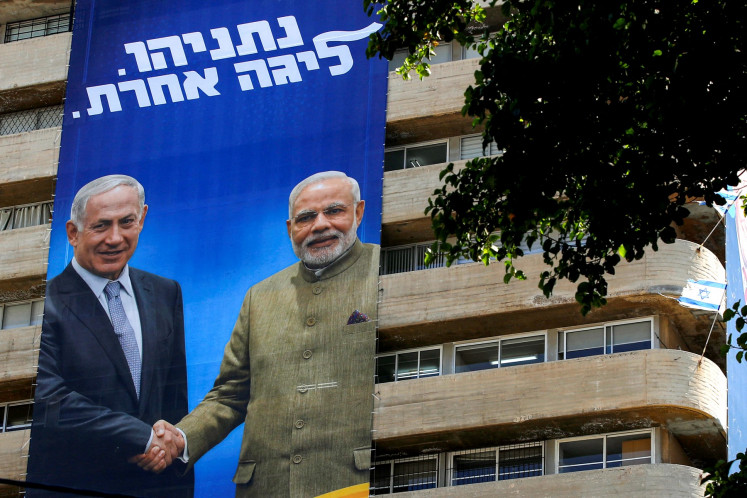Popular Reads
Top Results
Can't find what you're looking for?
View all search resultsPopular Reads
Top Results
Can't find what you're looking for?
View all search resultsConde Nast, New York Times suspend Russian operations
In a statement published on Conde Nast's website on Tuesday, chief executive Roger Lynch said the company was "shocked and horrified by the senseless violence and tragic humanitarian crisis in Ukraine."
Change text size
Gift Premium Articles
to Anyone
 The New Yorker magazine's October 15 edition is diplayed in an Upper East Side newstand in New York on October 9, 2012. The New Yorker has created a cover illustration, titled “One on One,” by Barry Blitt of the first presidential debate between President Barack Obama and GOP opponent Mitt Romney that seems to be a parody of Clint Eastwood‘s speech involving an empty chair at the Republican National Convention. (AFP/Timotyh A. Clary)
The New Yorker magazine's October 15 edition is diplayed in an Upper East Side newstand in New York on October 9, 2012. The New Yorker has created a cover illustration, titled “One on One,” by Barry Blitt of the first presidential debate between President Barack Obama and GOP opponent Mitt Romney that seems to be a parody of Clint Eastwood‘s speech involving an empty chair at the Republican National Convention. (AFP/Timotyh A. Clary)
C
onde Nast, which publishes magazines such as Vogue, Glamour and Vanity Fair, has said it is suspending publishing operations in Russia, citing the Ukraine conflict and the safety of its editorial staff.
In a statement published on Conde Nast's website on Tuesday, chief executive Roger Lynch said the company was "shocked and horrified by the senseless violence and tragic humanitarian crisis in Ukraine."
He said new legislation in Russia -- which could see individuals jailed for up to 15 years for publishing "fake news" about the military -- meant the publisher could not guarantee the safety of its journalists and editors.
"To that end, we have decided to suspend all of our publishing operations with Conde Nast Russia at this time."
Lynch said the company would continue its mission of producing trusted and compelling journalism.
The Russian edition of Vogue was first launched in 1998, according to Conde Nast's local website, and the publishing house produces Russian-language editions of titles including GQ, Tatler and Glamour.
The West has imposed a range of sanctions on Russia for its military incursion in Ukraine launched February 24, which have devastated the economy and pushed the central bank to impose sweeping capital controls.
Moscow has also seen a raft of cultural sanctions and dozens of high-profile brands have announced they are suspending operations over the conflict.
Earlier on Tuesday, the New York Times announced its editorial staff was pulling out of Russia over Moscow's punitive new media law, following other outlets that have withdrawn over safety concerns.
Russian authorities have blocked several independent media outlets, and last week moved to impose harsh jail terms for "false news" about the army as part of its efforts to muffle dissent.
"Russia's new legislation seeks to criminalize independent, accurate news reporting about the war against Ukraine," the New York Times organization said in a statement.
"For the safety and security of our editorial staff working in the region, we are moving them out of the country for now," it added.
The new law, signed by President Vladimir Putin on Friday, creates prison sentences of up to 15 years for spreading information aimed at "discrediting" military forces and also punishes any call to sanction Moscow.
Other Western media outlets have already suspended the activities of their correspondents in Russia for fear of reprisals, including Canada's CBC/Radio Canada, the German ARD and ZDF, and the Spanish RTVE, as well as the American agency Bloomberg News and the Spanish EFE.
The BBC said it would resume English-language broadcasting from Russia Tuesday, after suspending its reporting as it examined the tough new media laws.
The New York Times said it was focused on "returning as soon as possible while we monitor the application of the new law."









